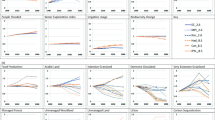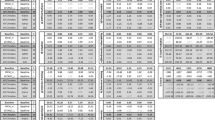Abstract
The world is not yet on track to meet the Paris Agreement climate change target of keeping global average temperature rise within 2 °C above pre-industrial levels. Current greenhouse gas emission trends point to much more substantial warming, with possible increases of 4 °C or more in the long-term. This Special Issue describes findings from the IMPRESSIONS project which advanced the understanding of impacts of high-end climate change (defined as global mean temperatures > 2 °C above pre-industrial levels) and potential solutions for reducing these impacts through adaptation, mitigation and transformative actions. With stakeholders, the project developed a set of integrated climate and socio-economic scenarios and applied these to multi-sectoral impact models in five case studies: Hungary, Scotland, Iberia, Europe as a whole and Central Asia. This showed that benefits in some regions and sectors, such as increasing forest productivity in northern Europe, are offset by detrimental effects in others, such as severe water scarcity, heat stress and loss of productivity in southern Europe and parts of central and eastern Europe, and widespread flood damage. Adaptation and mitigation pathways were generated with stakeholders to address these impacts and identify integrated and transformative solutions. These highlighted the importance of shifting to sustainable lifestyles, good governance for sustainability and climate resilience, and new forms of integrated and sustainable resource management. The stakeholder-led approach of IMPRESSIONS ensured that the research was driven by the priorities of decision-makers, enabling significant co-learning and the identification of robust, innovative and effective solutions for addressing high-end climate change.


Similar content being viewed by others
References
Benzie M, Carter T, Carlsen H, Taylor R (2019) Cross-border climate change impacts: implications for the European Union. Reg Environ Chang. https://doi.org/10.1007/s10113-018-1436-1
Capela Lourenço T, João Cruz M, Dzebo A, Carlsen H, Dunn M, Juhász-Horváth L, Pinter L (2019) Are European decision-makers preparing for high-end climate change? Reg Environ Chang. https://doi.org/10.1007/s10113-018-1362-2
Dunn M, Rounsevell MDA, Boberg F, Clarke E, Christensen J, Madsen MS (2019) The future potential for wine production in Scotland under high-end climate change. Reg Environ Chang. https://doi.org/10.1007/s10113-017-1240-3
Frantzeskaki N, Hölscher K, Holman IP, Pedde S, Jäger J, Kok K, Harrison PA (2019) Transition pathways to sustainability in greater than 2 °C climate futures of Europe. Reg Environ Chang. https://doi.org/10.1007/s10113-019-01475-x
Friedlingstein P, Andrew RM, Rogelj J, Peters GP, Canadell JG, Knutti R, Luderer G, Raupach MR, Schaeffer M, van Vuuren DP, Le Quéré C (2014) Persistent growth of CO2 emissions and implications for reaching climate targets. Nat Geosci 7(10):709–715. https://doi.org/10.1038/NGEO2248
Fronzek S, Carter TR, Pirttioja N, Alkemade R, Audsley E, Bugmann H, Flörke M, Holman I, Honda Y, Ito A, Janes-Bassett V, Lafond V, Leemans R, Mokrech M, Nunez S, Sandars D, Snell R, Takahashi K, Tanaka A, Wimmer F, Yoshikawa M (2019) Determining sectoral and regional sensitivity to climate and socio-economic change in Europe using impact response surfaces. Reg Environ Chang. https://doi.org/10.1007/s10113-018-1421-8
Fuss S, Canadell JG, Peters GP, Tavoni M, Andrew RM, Ciais P, Jackson RB, Jones CD, Kraxner F, Nakicenovic N, Le Quéré C, Raupach MR, Sharifi A, Smith P, Yamagata Y (2014) Betting on negative emissions. Nat Clim Chang 4(10):850–853. https://doi.org/10.1038/nclimate2392
Gramberger M, Zellmer K, Kok K, Metzger M (2015) Stakeholder integrated research (STIR): a new approach tested in climate change adaptation research. Clim Chang 128:201–214. https://doi.org/10.1007/s10584-014-1225-x
Harrison PA, Dunford RW, Holman IP, Cojocaru G, Madsen MS, Chen PY, Pedde S, Sandars D (2019) Differences between low-end and high-end climate change impacts in Europe across multiple sectors. Reg Environ Chang. https://doi.org/10.1007/s10113-018-1352-4
Holman IP, Brown C, Carter TR, Harrison PA, Rounsevell M (2019) Improving the representation of adaptation in climate change impact models. Reg Environ Chang. https://doi.org/10.1007/s10113-018-1328-4
Hölscher K, Frantzeskaki N, Loorbach D (2019) Steering transformations under climate change: capacities for transformative climate governance and the case of Rotterdam, the Netherlands. Reg Environ Chang. https://doi.org/10.1007/s10113-018-1329-3
Holzhauer S, Brown C, Rounsevell M (2019) Modelling dynamic effects of multi-scale institutions on land use change. Reg Environ Chang. https://doi.org/10.1007/s10113-018-1424-5
Kok K, Hesselbjerg Christensen J, Sloth Madsen M, Pedde S, Gramberger M, Jäger J, Carter T (2015). Evaluation of existing climate and socio-economic scenarios. EU FP7 IMPRESSIONS Project Deliverable D2.1. Available from http://www.impressions-project.eu/documents/1/
Kok K, Pedde S, Gramberger G, Harrison PA, Holman IP (2019) New European socio-economic scenarios for climate change research: operationalising concepts to extend the shared socio-economic pathways. Reg Environ Chang. https://doi.org/10.1007/s10113-018-1400-0
Lamperti F, Mandel A, Napoletano M, Sapio A, Roventini A, Balint T, Khorenzhenko I (2019) Towards agent-based integrated assessment models: examples, challenges, and future developments. Reg Environ Chang. https://doi.org/10.1007/s10113-018-1287-9
Madsen, M.S., Maule, C.F., Christensen, J.H., Fronzek, S. & Carter, T.R. (2016). IMPRESSIONS climate scenarios. EU FP7 IMPRESSIONS Project Deliverable D2.3. Available from http://www.impressions-project.eu/documents/1/
Madsen MS, Langen PL, Boberg F, Christensen JH (2017) Inflated uncertainty in multi-model based regional climate projections. Geophys Res Lett 44(22):11606–11613. https://doi.org/10.1002/2017GL075627
Moss RH, Edmonds JA, Hibbard KA, Manning MR, Rose SK, van Vuuren DP, Carter TR, Emori S, Kainuma M, Kram T, Meehl GA, Mitchell JFB, Nakicenovic N, Riahi K, Smith SJ, Stouffer RJ, Thomson AM, Weyant JP, Wilbanks TJ (2010) The next generation of scenarios for climate change research and assessment. Nature 463:747–756. https://doi.org/10.1038/nature08823
Pedde S, Kok K, Onigkeit J, Brown C, Holman IP, Harrison PA (2019) Bridging uncertainty concepts across narratives and simulations in environmental scenarios. Reg Environ Chang. https://doi.org/10.1007/s10113-018-1338-2
Rogelj J, Den Elzen M, Höhne N, Fransen T, Fekete H, Winkler H, Schaeffer R, Sha F, Riahi K, Meinshausen M (2016) Paris Agreement climate proposals need a boost to keep warming well below 2°C. Nature 534(7609):631–639. https://doi.org/10.1038/nature18307
Tàbara JD, Jäger J, Mangalagiu D, Grasso M (2019) Defining transformative climate science to address high-end climate change. Reg Environ Chang. https://doi.org/10.1007/s10113-018-1288-8
Terama E, Clarke E, Rounsevell MDA, Fronzek S, Carter TR (2019) Modelling population structure in the context of urban land use change in Europe. Reg Environ Chang. https://doi.org/10.1007/s10113-017-1194-5
UNFCCC (2016).Report of the Conference of the Parties on its twenty-first session, held in Paris from 30 November to 13 December 2015. United Nations Framework Convention on Climate Change FCCC/CP/2015/10/Add.1. Available from https://unfccc.int/process/conferences/pastconferences/paris-climate-change-conference-november-2015/paris-agreement
Acknowledgements
We are grateful to all IMPRESSIONS partners and stakeholders for their contributions to many productive discussions throughout the project.
Funding
This research was financially supported by the EU-funded IMPRESSIONS project (Grant Agreement 603416).
Author information
Authors and Affiliations
Corresponding author
Additional information
Publisher’s note
Springer Nature remains neutral with regard to jurisdictional claims in published maps and institutional affiliations.
Rights and permissions
About this article
Cite this article
Harrison, P.A., Jäger, J., Frantzeskaki, N. et al. Understanding high-end climate change: from impacts to co-creating integrated and transformative solutions. Reg Environ Change 19, 621–627 (2019). https://doi.org/10.1007/s10113-019-01477-9
Received:
Accepted:
Published:
Issue Date:
DOI: https://doi.org/10.1007/s10113-019-01477-9




